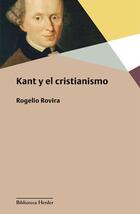
This comprehensive and in-depth study is intended to expose and evaluate the philosophical understanding of Christianity offered by Immanuel Kant, who did not pretend to judge the truth of Christian doctrines, but used them extensively to build a "moral religion."
The text addresses not only Kant's interpretation of various Christological dogmas, but also what the philosopher calls "the essential and most excellent of the doctrine of Christ," namely, the explanation that ethical formalism proposes of the commandment of love for God and neighbor, the peculiar Kantian interpretation of the Lord's Prayer and the philosophical exegesis offered by the Königsberg thinker of three famous verses from the Letter to the Romans: "Why not do evil so that good may come?", "All they have sinned "and" God is the one who justifies. " Christianity thus understood is not, therefore, the religion...read more






